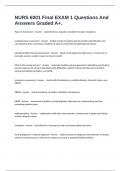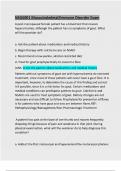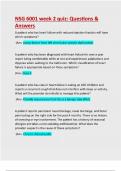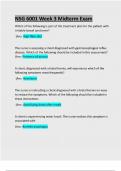NSG6001 (NSG6001)
South University
All 39 results
Sort by

-
Week 5 Review for Final Exam Questions With Solved Solutions.
- Exam (elaborations) • 9 pages • 2025
-
 TestSolver9
TestSolver9
-
- $10.49
- + learn more
Drug of choice to prevent and treat thromboembolism - Answer Warfarin Titrate INR to this in order to prevent events listed - Answer 2-3 Initial dose of warfarin - Answer 10mg unless older than 75, has co-morbidities, poor nutrition, elevated INR off warfarin, elevated liver tests, or changing thyroid status. Then start at 5mg per day Initial treat of upper or lower extremity DVT - Answer Short term treatment with SC LMWH, SC fondaparinux, or iv/SC Heparin for at least 5days...

-
NURS 6001 Final EXAM 1 Questions And Answers Graded A+.
- Exam (elaborations) • 12 pages • 2025
- Available in package deal
-
 TestSolver9
TestSolver9
-
- $10.99
- + learn more
Types of Assessment - Answer comprehensive, episodic or problem-focused, emergency comprehensive assessment - Answer (initial) results in baseline data for problem identification and care planning, time consuming, complete, all aspects of preventive health/physical disease episodic/problem-focused assessment - Answer based on the patient's health issues, involves one or two body systems. smaller scope, but more in depth What is the nursing process? - Answer systematic pro...

-
NSG 200 Final Exam Study Guide Questions And All Actual Answers.
- Exam (elaborations) • 8 pages • 2025
- Available in package deal
-
 TestSolver9
TestSolver9
-
- $10.49
- + learn more
tympany - Answer A student is performing a physical assessment on a patient. While assessing the abdomen, the student percusses the spleen. What sound would be normal for the student to hear? appendicitis - Answer An emergency department nurse is caring for a 17 year old patient who has severe pain in the umbilical area. Documentation shows that the patient exhibits "Rovsing's sign." What might this patient's medical diagnosis be? shingles (herpes zoster) - Answer When...

-
Exam Prep 6001 Latest Questions With Complete Correct Answers.
- Exam (elaborations) • 12 pages • 2025
- Available in package deal
-
 TestSolver9
TestSolver9
-
- $10.89
- + learn more
In a study of immune responses to the flu shot during pregnancy, one of the pieces of information collected about each participant is their pre-pregnancy weight (kg). This is an example of what type of data? - Answer Continuous One piece of data we have about the UUS population is the type of mental illness they reported having had in the past year. Responses are in the variable "mitype" and are summarized below. What type of mental illness was reported by the largest proportion of ...

-
Nursing 6001 Exam 1 Questions With Complete Solutions.
- Exam (elaborations) • 57 pages • 2025
- Available in package deal
-
 TestSolver9
TestSolver9
-
- $12.49
- + learn more
Infection - Answer disease state resulting from pathogens in or on the body health promotion and nursing assessment - Answer nurses assess health-promotion activities introduce screening questions collaboration body's defense against infection - Answer body's normal flora inflammatory response immune response factors affecting host susceptibility - Answer intact skin and mucous membranes normal ph levels body's white blood cells age, sex, race, ...

-
NSG6001 Advanced Nursing Practice I – dermatology Exam Questions And Correct Answers.
- Exam (elaborations) • 7 pages • 2025
- Available in package deal
-
 TestSolver9
TestSolver9
-
- $10.29
- + learn more
Papule - Answer Elevated, firm, circumscribed area < 1 cm example: warts Patch - Answer Flat, nonpalpable Irregular shaped macula > 1 cm vitiligo Macule - Answer skin color change w/out elevation. example: freckle note: Macule < 1 cm flat Patches are macules > 1 cm Plaque - Answer Elevated, Firm Rough lesion > 1 cm Ex: Psoriasis Wheal - Answer Elevated Irregular shaped Insect bite Allergic reaction Nodule - Answer Firm

-
NSG 6001 Final Exam Questions With Already Passed Answers.
- Exam (elaborations) • 9 pages • 2025
- Available in package deal
-
 TestSolver9
TestSolver9
-
- $10.39
- + learn more
Gastroenteritis - Answer Any patient that complains of diarrhea/vomiting needs this differential diagnosis GERD - Answer A patient that Wakes with bad taste in mouth/coughing has Staphylococcus bacteria - Answer The most common cause of food poisening Bowel Sounds - Answer A person must have this before advancing diet with food HBsAG - Answer Antigen found on surface of HBV; indicates hepatitis B infection. Gastric Ulcer - Answer Burning pain that radiates to the...

-
NSG6001:NSG6001 Package Deal: NSG6001 week 1:NSG6001 week 2: NSG6001 week 3;NSG6001 week 4:NSG6001 Final Exam:NSG 6001 Midterm Exam: Latest Updated A+ Guide Solutions
- Package deal • 8 items • 2025
-
 Joy100
Joy100
-
- $15.50
- + learn more
NSG6001 week 1:NSG6001 week 2: NSG6001 week 3;NSG6001 week 4:NSG6001 Final Exam:NSG 6001 Midterm Exam:NSG6001 Musculoskeletal Immune Disorder Exam:NSG6001: Advanced Nursing Practice I (dermatology):NSG6001 Quiz 4:GI/Thyroid: Questions & Answers: Latest Updated : Guaranteed A+ Score Guide Solutions

-
Week 2) NSG 6001/NSG 6001 week 2 quiz: Questions & Answers: Updated A+ Guide Solution
- Exam (elaborations) • 10 pages • 2025
- Available in package deal
-
 Joy100
Joy100
-
- $7.99
- + learn more
A patient who has heart failure with reduced ejection fraction will have which symptoms? (Ans- pump failure from left ventricular systolic dysfunction A patient who has been diagnosed with heart failure for over a year report being comfortable while at rest and experiences palpitations and dyspnea when walking to the bathroom. Which classification of heart failure is appropriate based on these symptoms? (Ans- Class II A patient who has class II heart failure is taking an ACE inhibitor an...

-
NSG 6001:NSG 6001 Week 3:NSG 6001 Midterm Exam: Questions & Answers: Guaranteed A+ Score
- Exam (elaborations) • 17 pages • 2025
- Available in package deal
-
 Joy100
Joy100
-
- $7.99
- + learn more
Which of the following is part of the treatment plan for the patient with irritable bowel syndrome? (Ans- High fiber diet The nurse is assessing a client diagnosed with gastroesophageal reflux disease. Which of the following should be included in this assessment? (Ans- Presence of pyrosis A client, diagnosed with a hiatal hernia, will experience which of the following symptoms most frequently? (Ans- Heartburn The nurse is instructing a client diagnosed with a hiatal hernia on ways to r...

How much did you already spend on Stuvia? Imagine there are plenty more of you out there paying for study notes, but this time YOU are the seller. Ka-ching! Discover all about earning on Stuvia


